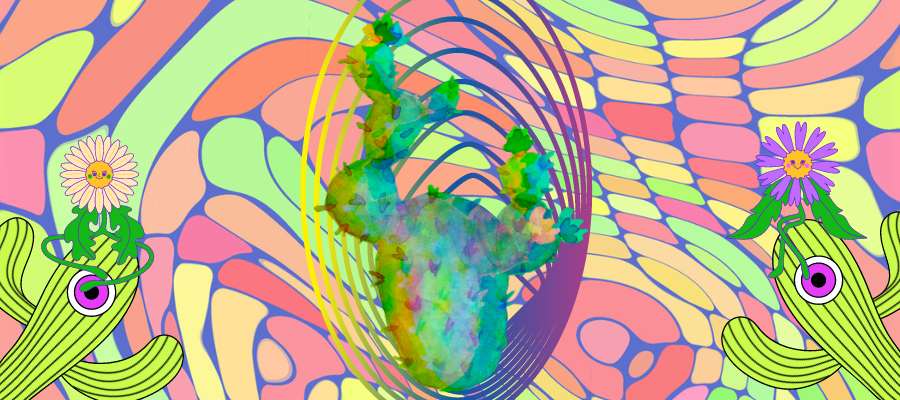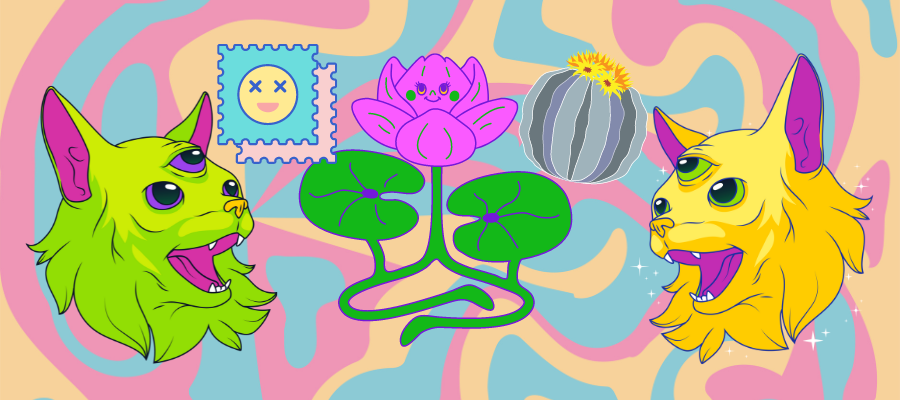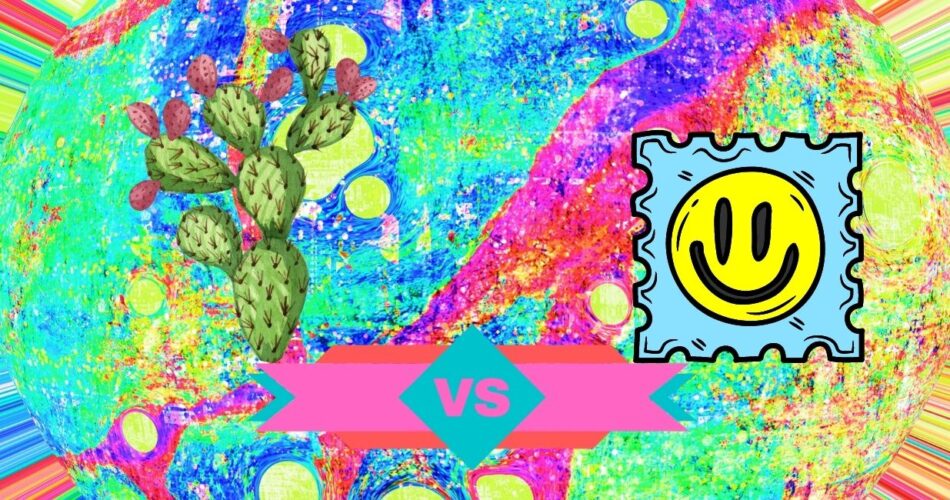Mescaline, the active ingredient in the peyote cactus, and LSD, a synthetic drug, are both hallucinogens. They produce similar but also different effects in users. Some people prefer mescaline, while others prefer LSD. What are the key differences between mescaline vs. LSD?
| Mescaline | LSD |
|---|---|
| natural🌱 | synthetic⚗️ |
| effects last up to 8 hours | effects last up to 12 hours |
| mind-altering states✨ | mind-altering states✨ |
| non-addictive✨ | non-addictive✨ |
What Is Mescaline (Peyote Cactus)?

Mescaline is the primary active ingredient in certain species of cacti, most notably the Peyote, but also in other species like San Pedro. This alkaloid has been used for centuries by Native American tribes for religious and ceremonial purposes.
Mescaline is known for its short-lived but powerful effects. Depending on dosage, it can produce a trance-like state, altered consciousness and heightened awareness. The effects may last from three to eight hours.
Fun Fact
In the animated series Avatar: The Last Airbender, one of the characters, Sokka, gets high on cactus juice. He experiences strong and vivid visuals, as well as “profound” visions. It has never been directly stated, but it’s safe to assume it was the Peyote cactus itself.
What Is LSD?
LSD, or lysergic acid diethylamide, is a synthetic hallucinogenic drug. It was developed in 1938 and first introduced to the public in the 1960s. LSD is known for its incredibly powerful effects, including altered perception of reality and intense visuals. The effects usually last between 6 and 12 hours.
LSD affects serotonin 5-HT2A receptors in the human brain and can induce positive effects like improved mood, heightened creativity, and decreased fear and anxiety. What are the differences between mescaline vs. LSD? Keep reading to find out!
Mescaline vs. LSD: Similarities in the Effects of These Hallucinogens

Both LSD and mescaline use can produce powerful psychedelic effects that alter perception and consciousness. Both are known for producing intense visuals, altered thought processes, changes in mood and emotion, and feelings of euphoria.
Both drugs also produce certain physiological effects, including increased heart rate and body temperature, nausea, dilated pupils, and changes in appetite.
Mescaline vs. LSD: what about their safety and risks? Both mescaline and LSD are considered relatively safe when used responsibly. However, both drugs can lead to dangerous situations if not taken properly (like psychosis, serotonin syndrome, etc.) The effects of psychedelics can be unpredictable and overwhelming, especially in people with underlying mental health issues.
Are they addictive? Mescaline and LSD are not considered addictive substances. However, users may develop a tolerance to them over time, which can lead to an increased risk of overdose and harmful effects on the central nervous system.
Mescaline vs. LSD: Differences

The primary difference between mescaline vs. LSD is the duration of their effects. Mescaline’s effects usually last for 3 to 8 hours, while LSD’s effects may last up to 12 hours. Additionally, mescaline is an organic compound found in nature (same as psilocybin) and extracted from cacti, whereas LSD is a synthetic drug created in a laboratory.
Also, mescaline produces more subtle and gradual effects than LSD. The onset of mescaline’s effects is usually within 30 minutes, while the effects of LSD can be felt almost immediately after ingestion.
Finally, the use of mescaline and LSD produce slightly different visuals and perceptual experiences. The effects of mescaline are more “natural” or “earthy” visuals compared to LSD, which can induce more intense and abstract hallucinations.
In conclusion, mescaline and LSD are both powerful hallucinogens that can produce a variety of effects. While they have similarities, each drug produces different effects and has unique risks.
Similar Posts:
- Mescaline vs Peyote Cactus: A Short Comparison
- The Marvel of Echinopsis Peruviana: Meet the Peruvian Torch Cactus, San Pedro and Peyote’s Mescaline Cactus Cousin
- Is San Pedro Cactus Legal? The Legality of Echinopsis Pachanoi
- Is Peyote Legal? Can You Cultivate It? | The Legal Status of Peyote
- How Long Does Peyote Last? Duration of a Mescaline Trip
- Peyote vs Ayahuasca: How Do They Affect the Brain?
- San Pedro Cactus (Echinopsis Pachanoi) 🌵 All You Need to Know





